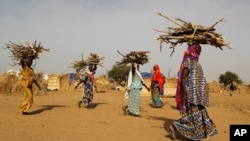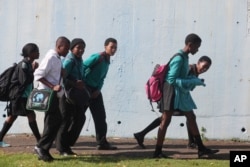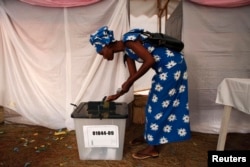A new report finds economic and social discrimination against women is costing Africa more than $100 billion a year. The U.N. Development Program’s 2016 Africa Human Development Report argues closing the gender gap would be a boon for the Continent’s economic and social prospects.
The report finds African women across the board are denied the same kind of economic, social and political opportunities men enjoy. It says women lose out when it comes to education, work and health.
It notes fewer girls than boys go to school, women earn less money than men for paid labor, harmful traditional practices affect their health, and certain cultural norms act as a hindrance to women moving ahead in society.
The report finds practices, such as child marriage and sexual and physical violence adversely affect women’s health and result in high maternal mortality.
Ayodele Odusola is U.N. Development Program chief economist for the Regional Bureau for Africa. On a line from Nairobi, Kenya, he tells VOA evidence shows countries that invest heavily on gender equality tend to perform better on human development.
“On the basis of this, investing in gender equality and women’s empowerment is not only a human rights issue, but it is good economics and at the same time a development imperative," he said. "What we learn is that if we are able to address the impediment in the labor market, for instance, it is going to enhance not only social-economic opportunities of women, but it is going to enhance the growth opportunities for African countries.”
Consequences
The report notes sub-Saharan Africa pays a very high price for maintaining discriminatory gender policies. It estimates total economic losses due to gender inequality in the labor market in 2014 cost the region $105 billion, or six percent of its Gross Domestic Product.
U.N. economists point to Rwanda as one of a few African countries that has increased the level of its human development index — that is, its life expectancy, education, and per capita income — by bridging the gender divide.
Ayodele Odusola says some things are beginning to change for the better elsewhere in Africa. He says reproductive rights are becoming acceptable in Niger and Burkina Faso countries where talk of family planning used to be taboo. He says Gambia is one of several countries that have banned early child marriage.
The report proposes several strategies for creating greater gender equality. It calls on African countries to adopt legal reforms, to give women a greater voice in decision-making, to actively promote gender equality and women’s empowerment, and to ensure women have ownership of assets and management of resources.






